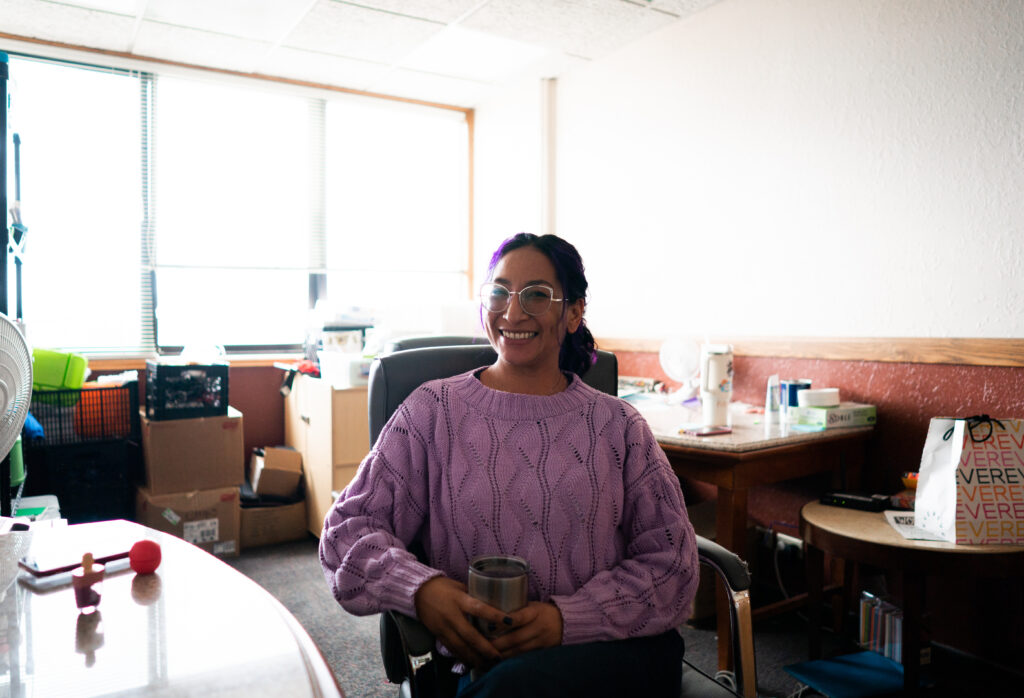By Erin Sheridan
Word on the Street, Edition 16

Caption: Carla Velez sits in the office at the hotel where Interfaith Sanctuary hosts its program for families. Credit: Erin Sheridan.
BOISE — Interfaith Sanctuary is a shelter where families stay together. Faith leaders in Boise founded the nonprofit in 2005 after Community House, a shelter that was operated by the City of Boise, was handed over to a shelter system that then enforced a men-only policy. Families that did not want to separate suddenly found themselves with nowhere to go. Faith leaders stepped in, hosting families across the community until a building was located on River Street. But years down the road, families were still asked to leave the shelter each morning at 7 a.m. Those families would be on the street until evening check-in.
This is a common practice at emergency homeless shelters across the United States. Living on the street places people experiencing homelessness into survival mode. As case managers at Interfaith began to realize that families could not stabilize unless they had a place to be during the day, the shelter founded its family program to address this problem. Since November 2017, families in the program have 24/7 access to the shelter.
“We started this because we were really starting to invest in our case management and the families were exhausted, and we were getting no traction,” said Interfaith Sanctuary’s executive director Jodi Peterson-Stigers. “We needed to give the families a safe space to be able to do this work. The basis of the program is to give families that space so that babies can nap, children can get early education, and parents have the stability they need to take care of their family needs and focus on their future with hope and support.”
Interfaith Sanctuary housed the family program inside its River Street building until 2020, when the organization moved families to a local hotel using pandemic-related emergency funding. This expanded the number of family beds, which according to Peterson-Stigers is an ongoing process. And while the program has been successful, the need in Boise is great. In November, the city was ranked the 2nd least affordable housing market on the continent, with home prices at 72% above what a median-income household can afford. The National Association of Rental Property Managers of Southwest Idaho listed rental vacancies in Ada County at 3.6% in the third quarter of 2021, with neighboring Canyon County at just 1.93%.
In response to this growing need, Interfaith will be expanding staffing to help get more families off the street and into the program, Peterson-Stigers said. The shelter’s relocation to State Street will allow the program to accommodate 96 family members versus the current limit of 40. The new family dorm has been designed so that families will have individual units. Currently, 14 families stay at the hotel. But an average of 150 families have been on the waitlist for the program since it opened, said Carla Velez, supervisor of case management for the family program.
At the hotel, Velez coordinates with families to get them into shelter. She also works to build trust. “We cannot approach a crisis and expect them to work on their mental health, jobs, legal issues, or schooling when they are living in their cars or in a tent. That’s survival mode,” said Velez. “You have to make sure these families have food and a safe place to stay. Once we have reached the point where they feel like they’re in a place that’s clean, safe for their kids, and where their confidentiality and privacy is respected, then we can start working. It’s like any type of relationship. You have to build that trust.”
Case managers help families do things like apply for benefits, finish taxes, and search for jobs and permanent housing. For kids, there are education and activity programs where staff seek to foster a strong sense of community among the families. Case managers emphasize giving families agency in the process of reconnecting to available services, asking them what they need. Stays can be anywhere from six months to a year and it’s important to create an environment where people can succeed. “It’s just building those bridges and creating those relationships,” said Velez. “Once you get people safe and show them that you care, everything starts flowing.”
Interfaith’s program is designed to respect the individuality of guests. “Everybody has a different life path,” said Velez. “We have a lot of really interesting people here, and when we generalize the homeless community, we are missing how fascinating they are.”
Velez and other case managers encounter guests that have lost family members, have medical bills, or have been evicted with no support system to catch them. They see people working full time that can’t afford apartments, people who make art, write books, and more.
“I see a lot of medical bills, a lot of families struggling with sickness and conditions that are not their fault at all,” said Velez. “Then there are people who have a record and cannot find employment. Many people have struggled with mental illness and have a hard time keeping a job and a network, so when they find themselves in crisis, they don’t have anywhere to go. The same goes with substance use.”
Inside the hotel, families can stabilize and rest knowing that at least they have a place to be. “We have seen what happens in other cities when you do not do things on time,” said Velez. “We cannot prevent evictions, sadly. We should. But since that isn’t happening, the next step is how we prevent people from ending up in the streets and getting deeper and deeper into their crisis and poverty.”
“In our program, you can see the change right away, from survival mode to finally taking a deep breath.”
